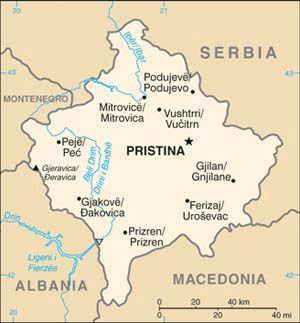Kosovo: Who Does The ISG Speak For? – Analysis
With the ISG saying it plans to leave by the end of 2012, even whilst outstanding issues – including the north – remain, the UN must be prepared to play an essential buffering role between the two sides in the status dispute.
By Gerard M. Gallucci
The International Steering Group (ISG) met on January 24 in Vienna to consider its 2012 program for Kosovo. The forum issued a communique calling upon the government of Kosovo to continue to implement the Ahtisaari Plan, aiming to complete outstanding elements so that the period of “supervised independence” could terminate by the end of this year. The ISG reaffirmed its commitment to Kosovo’s “territorial integrity within its existing borders.” The ISG also called upon Serbia to “abide by its international commitments and refrain from interfering in Kosovo, including by withdrawing its police, security, and other state presences, and supporting efforts by international actors and the institutions of Kosovo to promote the rule of law.” The group also demanded that Belgrade “ensure that its local elections are not extended into northern Kosovo.”

The ISG has, in effect, demanded that Serbia pull out from Kosovo and assist in bringing the north under the administration of Pristina. It called the continued presence of Serbian institutions there “interference” and not in line with Serbia’s “international commitments.” Who is the ISG speaking for here? The answer can only be that it speaks for itself, a self-chosen group of 25 countries brought together – in another of those Bush-era “coalitions of the willing” – to legitimate Pristina’s unilateral declaration of independence.
The ISG does not speak for the international community and certainly not for the United Nations or the Security Council. It speaks for those countries – led by the Quint – that saw fit in 2008 to step outside UN Security Council Resolution 1244 and to take on the political and financial costs of shepherding the new state through a shaky start-up. Politically, the ride has been rougher than expected, with recognitions even now from less than half of the UN membership and many internal problems remaining. So now, the Quint is in a hurry to cut the costs and split. The ISG speaks very much for itself and certainly not for the people of Kosovo.
The ISG – really the US, Germany and Brussels – are tired of Kosovo and impatient to leave. This is dangerous. Being in a hurry may lead the Quint to make mistakes. Right now, Washington, Berlin and Brussels appear to be looking to diplomatic pressure on Belgrade. If Serbia’s president, Boris Tadic, wants EU candidacy enough, he’ll accept surrender on the ISG’s terms. Comments reportedly made by the EU’s enlargement commissioner, Stefan Füle, make that clear. He emphasized that Serbia’s chances to receive candidacy next month hinge on accepting further concessions in the Belgrade-Pristina dialogue and bringing down the barricades in the north.
What happens if the “diplomatic” pressures fail to produce the desired effects? It’s possible that recent British and French comments indicate a possible opening for a negotiated, compromise solution for the north. Is that opening real, however, or simply wheel-spinning till spring? The Self-Determination party is already adding to the pressure on the Kosovo administration to do something about the north by making it crack down against barricades in the south.
It must be clear by now that there is no military solution to the north. Any determined use of force against the northern Kosovo Serbs by anyone will likely lead to violence and partition. Tadic cannot make this any less so. The ISG saying it plans to leave by the end of 2012, however, implies a threat to ensure the implementation by then of Kosovo’s “rule of law.”
As noted previously, the end of “supervised independence” also raises another issue. If the ICO and EULEX leave or substantively end their missions while outstanding issues – including the north – remain, who assumes the essential buffering role between the two sides in the status dispute? This can only be the UN, which still has the peacekeeping responsibility under 1244. The UN should be developing plans now for a stepped up presence – including police – for the north. Without political agreement – discounting a simple breakdown into renewed war – it will still need to do what the Security Council sent it to Kosovo to do, keep the peace.
Gerard M. Gallucci is a retired US diplomat and UN peacekeeper. He worked as part of US efforts to resolve the conflicts in Angola, South Africa and Sudan and as Director for Inter-American Affairs at the National Security Council. He served as UN Regional Representative in Mitrovica, Kosovo from July 2005 until October 2008 and as Chief of Staff for the UN mission in East Timor from November 2008 until June 2010. Gerard is also a member of TransConflict’s Advisory Board.

Excellent analysis!